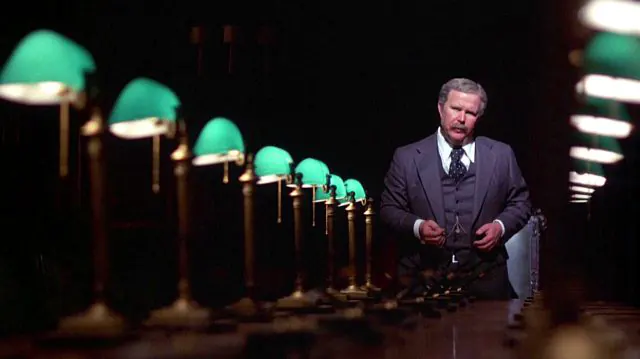From Intimacy To All Hell Breaks Loose...
Reading Dan Gilroy’s Nightcrawler recently, the movie that popped into my mind was Network (1976). Both films make a statement about the role of the media, the way those media are run, and ultimately the state of our society. Network tells the story of Howard Beale, who announces his suicide on-air, after being sacked for poor ratings. The dramatic turn sends the ratings skyward and not only is he re-hired, he is allowed to rave against the forces that lead to his dismissal in the first place. Overnight, Howard becomes the station’s ratings whore and cash cow.
At the movie’s classic mid-point, Beale urges the viewers to open their windows and call out “I'm as mad as hell and I'm not going to take this anymore!” It would be the obvious choice for discussion, but this time around I was astounded by a different scene. Howard Beale’s preaching causes a whirlwind of politics at the highest echelons of the network, leading to a spectacular crisis point, a scene that in any contemporary movie would be a classic movie moment.
LUMET
Network boasts a mind-blowing cast: Peter Finch, William Holden, Robert Duvall and Faye Dunaway. It was directed by Sidney Lumet, whose films always captured characters and values that express the dilemma’s of modern day society, often played out against the backdrop of New York. Lumet’s movies should all be mandatory viewing: Dog Day Afternoon, 12 Angry Men, The Verdict, Serpico and The Pawnbroker.
Quite incredibly, Lumet Never won an Oscar, despite being nominated 5 times. Writer Paddy Chayevsky received three, out of only four noms. He won his last Academy Award - best original screenplay - at the 1977 Oscars, for Network.
GREED IS GOOD
The film is full of great cinematic fireworks, and therefore our movie moment risks to blend into them, unnoticed. But look at it in isolation, and you’ll see its power - and the timeless truth writer Paddy Chayevsky spits in our faces.
The moment is a monologue in the tradition of Gordon Gekko’s ‘greed rant’, only it predates it by 11 years. The scene lasts more than four minutes, and it delivers the core theme of this movie: all human values must bow to money. Remarkably, the tirade is not delivered by the protagonist, not even any of the four top billed actors. Instead, it is ‘Stocky, genial looking supporting actor’ (IMDb) Ned Beatty who takes centre stage as the network CEO. The actor demonstrates a tremendous versatility and depth through his shapeshifting character of Jensen, much like Lotso Bear, the two-faced strawberry-flavoured cuddly toy from Toy Story 3, which Beatty also inspired with his voice.

HELL IN THE BOARDROOM
Jensen guides Howard Beale to the board room, and makes him sit down. As he darkens the room, it transforms into the mythical Cave, where our hero awaits his Ordeal. The only light coming in illuminates Jensen as if he were going to perform on stage. Or as Chayevsky describes it: “A shaft of white light shoots out from the rear of the room, spotting Jensen on the podium, a sun of its own little galaxy.”
If it first appeared as if the scene was set for a somewhat intimate moment, this illusion is shattered quickly. Jensen stays on the far end of the table — and all hell breaks loose.
Read an excerpt from Sidney Lumet's Network Screenplay.
Karel Segers
Karel Segers wrote his first produced screenplay at age 17. Today he is a story analyst, script editor and producer with experience in rights acquisition, script development and production. His
screenwriting classes have trained writers in Australia, Europe, Asia and the Middle East, and his clients include international award-winning filmmakers as well as three Academy Award nominees.
Karel is the founder of
The Story Department and he ranks in the world's Top 10 of most influential people for screenwriting on Twitter.